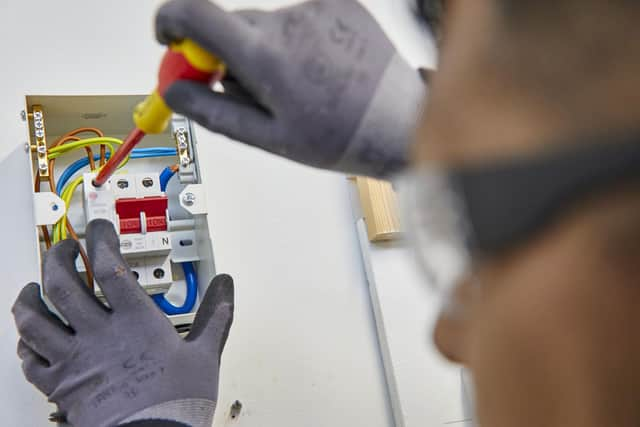A lack of qualified electricians is going to cause a net zero bottleneck - Nikki Davis
‘World breaches 1.5C global warming threshold for full year’ was the stark warning from the EU's climate service that global warming will have significant effects on all our lives.
And yet, the impact of this kind of news seems to be diminishing.
Advertisement
Hide AdAdvertisement
Hide AdIn our region, the Mayor of West Yorkshire, Tracy Brabin, has convened a Green Jobs Task Force and brought together employers, education, and civic partners to great effect. In total, 1,000 green jobs were pledged across West Yorkshire and work is moving into its second phase.


However, what is woefully misunderstood on a national level is the importance of skills in reducing carbon emissions. More specifically, our good work on a local level is being hampered by a shortage of one specific skill, which no one seems to be talking about.
Where are all the electricians going to come from?
We urgently need professionals to fit solar PV panels, heat and ground source pumps, EV charging points, and much more on a scale never seen before.
Whether it’s new-build houses, retrofits, or electric vehicles, a growing lack of qualified electricians is going to cause a bottleneck in a system just when we need it to be as free-flowing as possible.
Advertisement
Hide AdAdvertisement
Hide AdData from The Electrical Contractors’ Association (ECA) shows that there are currently 170,000 fully qualified electricians in the UK, with 23,000 apprentices in training.
Yet, to meet increasing demands, the industry needs 12,000 newly qualified electricians each year.
In fact, the UK Trade Skills Index 2023 estimates that over 100,000 new electrician recruits are needed by 2032.
Given that an electrical apprenticeship takes four years, we need to think seriously about how we can double the number of electrical apprentices… and quickly.
Advertisement
Hide AdAdvertisement
Hide AdBefore anyone assumes that this shortfall might be due to a lack of interest or that young people don’t want to be electricians anymore, you couldn’t be further from the truth.
Further Education (FE) colleges and private training providers have long waiting lists of young people asking to become electricians.
So, if the demand and work are there, why do we still not have enough electricians to meet the construction sector’s needs?
The number one issue facing providers, including Leeds College of Building, is recruiting and retaining enough qualified teaching staff.
Advertisement
Hide AdAdvertisement
Hide AdAt Leeds College of Building, a lecturer can earn over £40,000 per year, which is one of the highest salaries in the FE landscape. However, compare that to a working electrician, and it doesn’t come close to average earnings.
An excellent pension and generous holiday entitlement (plus two weeks off at Christmas) are some of the benefits of working in FE, alongside the best part: working with amazing, challenging, funny students who are supported to progress into exciting careers in an ever-evolving sector.
Sadly, though, we rely on the hope that professional electricians remember their experience at college and want to support others, just as they were helped when they started out.
The difficulty is that we shouldn’t depend on altruism. Becoming a lecturer should be a career option, respected and valued by policymakers who recognise the critical role electricians will play in the future.
Advertisement
Hide AdAdvertisement
Hide AdPay is not the only issue. Other aspects of the education system need urgent consideration and swift reform.
We need access to critical funding to upskill qualified electricians in green technologies; support for more employers to take on apprentices to widen opportunities; to urgently review the impact of new T Level qualifications on the trade; and to ensure a clear progression route from the classroom to the workplace.
As we mark national Colleges Week, this week, we take the time to celebrate the incredible work colleges do across the country. At Leeds College of Building, we will continue to offer electrical training from apprenticeships through to industry regulation short courses alongside over 200 other construction and built environment training programmes.
Leeds College of Building is at the heart of the Leeds community, serving 5,500 students and apprentices and delivering crucial education and construction skills.
Advertisement
Hide AdAdvertisement
Hide AdWe are working hard to create an inclusive society and a growing and productive economy, but this can’t be done without more funding to support in-demand courses or the talented staff to deliver them.
Nikki Davis is principal and CEO of Leeds College of Building.
Comment Guidelines
National World encourages reader discussion on our stories. User feedback, insights and back-and-forth exchanges add a rich layer of context to reporting. Please review our Community Guidelines before commenting.